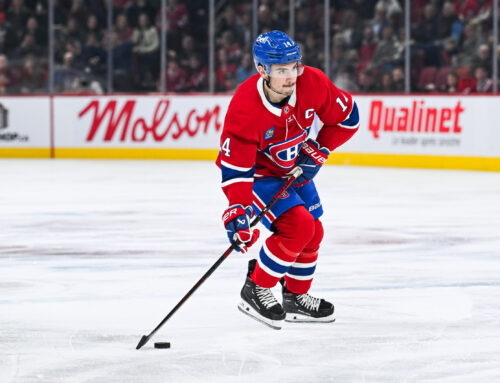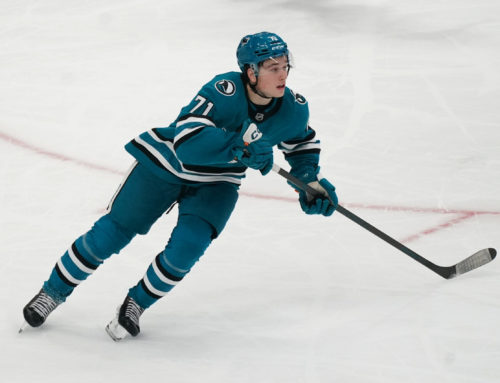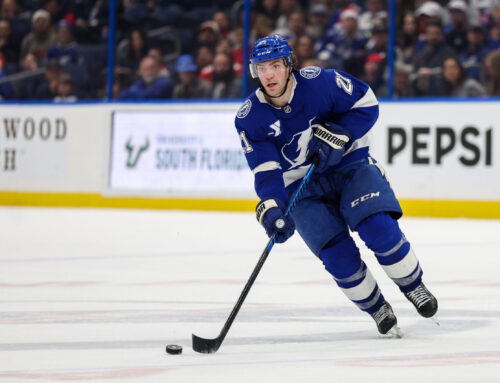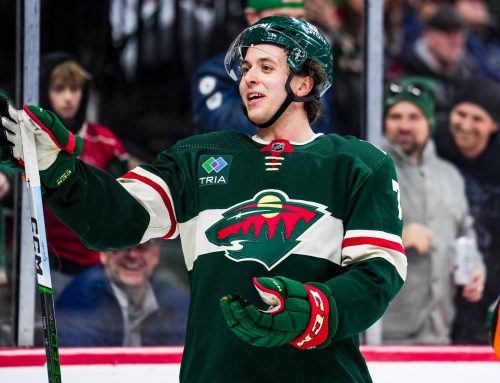Welcome back to Forum Buzz, where I peruse the DobberHockey Forums and weigh in on very active, heavily debated, or otherwise relevant recent threads, reminding everyone how great of a resource the Forums are, especially now that the season has been suspended. Nearly anything might be covered here, other than trades and signings, which usually will get their separate write-ups on the main site and are also covered in the next day’s Ramblings, or questions specific to salary cap issues, which is the domain of Alex MacLean’s weekly Capped column.
As a reminder, you can access the actual forum thread on which the question is based by clicking on the “Topic” for each question.
Topic #1 – What nine forwards and four defensemen should be kept from the following list in a nine-team league where 4C, 8W, 6D and 2G start and the skater categories are: G=3, A=2, +/-=1, SOG =0.4, PIM=0.25, PPP=1?
C: Connor McDavid, Jack Eichel, Vincent Trocheck, Nazem Kadri
W: Artemi Panarin, Nicolaj Ehlers, Brock Boeser, Blake Wheeler, Max Pacioretty, Evander Kane, Oliver Bjorkstrand, Victor Olofsson
D: Dougie Hamilton, Seth Jones, Shea Weber, Mark Giordano, Ryan Pulock, Drew Doughty
G: Carter Hart, Igor Shesterkin
Bench/prospects
Christian Dvorak, Kirby Dach, Morgan Frost, Ryan Getzlaf, Timo Meier, Clayton Keller, Jaden Schwartz, Nino Niederreiter, Jordan Kyrou, Evan Bouchard, Oscar Klefbom, Josh Morrissey, Jake Gardiner, Antti Raanta, Elvis Merzlikins, Mikko Koskinen
Let's get the "no brainers" out of the way first, and those are McDavid, Eichel, Panarin and Hamilton. That leaves six forwards and three defensemen still to add to the list.
Looking first at defensemen, given the categories Jones is too good to let go. The dilemma is what to do about Weber and Giordano, each of whom might be on his last legs or could still have another season or two of useful production. With goals, SOG and PPPts mattering, I like Weber over Giordano, plus Weber is two years younger to boot. The last d-man spot is probably between Pulock, Doughty, and Klefbom, and I'm opting for Klefbom, who has taken a huge step forward and should be the rearguard anchor of Edmonton's ultra-potent PP1 for years to come. More on Klefbom in Topic #3 below.
That leaves six other forwards from which to choose. Given the categories, I think Kane has to make the list. After that, it gets murky, with a case to be made for everyone from Trocheck, to Ehlers, to Boeser, to Wheeler, to Pacioretty, to Olofsson, to Bjorkstrand, to Keller. One key is twice as many wingers start as centers, the deepest fantasy position, so I think that makes Trocheck a non-keep. Also, Keller hasn't taken off like many had expected, and doesn't offer great peripherals, so I'd let him go back into the draft pool. That leaves one more non-keep, and for me, it's either Ehlers, who's a fine player but for whom it seems more and more apparent with each passing year that he won't likely become more than a 60-65 point guy, or one of Bjorkstrand or Olofsson, both of whom have looked great this season but are not guaranteed to be home runs. I think Ehlers is the drop, as the home run potential of Olofsson and Bjorkstrand are too tempting, especially since the team will be keeping so many other safe bets.
So the final list is McDavid, Eichel, Panarin. Boeser, Wheeler, Kane, Pacioretty, Olofsson, and Bjorkstrand as forwards, plus Hamilton, Jones, Weber and Klefbom on D.
Topic #2 – What seven keepers should be chosen in a 14 team H2H league which starts 2C, 2RW, 2LW, 4D, 2 UTIL, 2G and has the following as categories: G, A, PPPts, Hits, PIM, +/-, GWG, W, L, SO, SV% and requires three goalie starts per week?
F – Auston Matthews, Tom Wilson, Alex Ovechkin, Filip Forsberg, Mitch Marner, Gabriel Landeskog, Anthony Cirelli, Sam Reinhart, Patric Hornqvist, Evgeni Malkin, Andreas Athanasiou
D – Ryan Graves, Keith Yandle, Thomas Chabot, Mark Borowiecki, John Carlson
G – Carey Price, Alexander Georgiev, Ilya Samsonov
First off, with three goalie starts per week and a 14 team league, that makes it so a goalie has to be kept. And say what you want about Price this season, but Montreal doesn't have any better options and is seemingly on a path to improve as a team, so I'm holding onto Price over the other younger two options, both of whom won't pay enough immediate dividends.
Here I think there are five clear-cut keepers: Matthews, Ovechkin, Marner, Malkin, and Carlson. After that, a case likely could be made for Yandle or Chabot, or Landeskog, Wilson or Reinhart. With 4D starting, I can see the reasoning behind keeping a second defenseman, whom if it was me it would be Chabot in a squeaker over Yandle. Yes, Yandle has been super consistent for years, but he's not getting any younger and, it bears noting, Aaron Ekblad had more second-half points, whereas Chabot, albeit on a poor team, is "the guy." More on Chabot in the next topic.
Among the three forwards, Landeskog would have been the clear choice if this was a season ago; but he's taken a step back overall, although he'd posted 18 points in his last 13 games. Wilson provides tons of Hits and PIM, nearly 2.5 SOG per game, plus a 50-55 point scoring rate. That's a lot of stat-stuffing. Reinhart has the highest points ceiling but the worst peripherals. If it's me, I go with Wilson, who's carved out a spot in the top six and gives so much value in so many of these categories. Landy is the risk/reward pick in that if he can rebound to be a 70+ point guy yet again, then the scales tilt to him. As for Reinhart, he's finally found a permanent spot next to Eichel and, if his trajectory continues, could be a point per game player within a season or two. But even at a point per game with lots of PPPts, he still might not hold as much overall multi-cat value as the other two, and thus he'd be the one forward I'd let go back in the draft pool. So, in the end, I'd either go with Wilson or Landeskog for the last forward or with Chabot, depending on how important it is to keep a second D.
Topic #3 – Given how this year has unfolded, does Oscar Klefbom now have more keeper value than Thomas Chabot?
I touched upon both guys in the previous questions. But let's take a deeper dive on each, in a nod to my old Cage Match columns.
Chabot has disappointed; however, his shooting percentage is roughly half his career number despite him taking roughly the same rate of SOG per game this season. So right there, tack on another handful of points he should rightfully have.
One concern is his OZ%, which was 62% in his rookie season and 52% in 2018-19, yet was down to 47.6% this season. But I think that is almost entirely a function of how poor his team is, since after all Chabot was averaging 26 minutes per game, of which 3:15 was on the PP but less than 15 seconds was spent killing penalties, so to a large extent, his defensive zone starts are coming as a result of poor puck possession by his team.
Notably, since 2010-11, the highest overall TOI of any defenseman who averaged at least 3:00 of PP time per game but less than 15 seconds of SH duty per contest has been 24:09, with more than half not even averaging 22:00 per game in the applicable season. What does this mean? Once Ottawa turns things around as a team, Chabot will be well-positioned to reap the scoring benefits due to all his ice time, tons of which is with the man advantage and next to none of which is in the form of unproductive PK duty.
The issue is Ottawa might be a bad team for several years to come, leaving Chabot a talented rearguard without a supporting cast to help give him offensive starts and/or scoring. But why then was he able to produce so well last season? It's easy to forget that Ottawa was a decent scoring team last season, to the tune of 2.95 goals per game, whereas for 2019-20 they were down to 2.67 per contest. Add to that Chabot shooting a bit higher than his norm and being on the ice for a very high – for a poor team – 10.48 team 5×5 shooting percentage, and we can see that he likely overachieved last season. So until Ottawa improves, think of Chabot as a 50-60 point defenseman, with the range depending mainly on the goals scored by his team.
As for Klefbom, 57.6% of his points came via secondary assists (versus goals plus primary assists). And among players with 30+ points, that's the second-highest percentage in the entire NHL, with no others being above 48.5%. Offsetting that somewhat, however, is the fact that his IPP is 33.3% after being 42% last season and an average of 40% over the past five seasons. So although he's getting an unsustainably high percentage of secondary assists, he's not factoring in as many points as normal. All in all, it's likely a wash.
Klefbom also was logging 3:38 of man-advantage time per game and had tallied a PPPt in every one out of three games this season. If 3:38 per game sounds like a lot, it is – there were just 19 total instances of any rearguard averaging at least that much PPTOI per game in any of the prior four seasons. Of the 19, only four scored at lower than a 55 point full season scoring pace in the applicable season. And many of them were on far less offensively potent teams than Klefbom. As such, big things should lie ahead for him if, as one would expect, Klefbom's PP usage remains this high.
There's also the fact that Klefbom has a mere ten goals since the start of 2017-18. Let's keep in mind that despite missing time this season as well as 37 games over the prior two campaigns, Klefbom stands 20th among d-men in total SOG, yet ranks tied for 83rd in goals since 2017-18. And this also is someone who had a 12 goal season back in 2016-17, so he can put pucks in the net. Between this sustained stretch of bad luck, all his PP time, and SOG on the PP (he's 20th in that category too despite missed games), he's bound to see more goals in the normal course.
So which do I like more in terms of keeper value? I think it depends on the league, as straight points I'll probably take Chabot, barely; but in a multi-cat, I give the clear edge to Klefbom due to his heaps of blocks, his PP role, and what should figure to be a slightly less bad +/-.
Topic #4 – In what leagues is Erik Karlsson still keepable?
This is a question no one would've even contemplated as recently as two seasons ago. But now, with (1) Karlsson's point pace having dropped for the fourth straight campaign, (2) his new huge contract having kicked in, and (3) him being on a team that not only has Brent Burns to provide blueline scoring but also has a tough time scoring in general, it's no longer sacrilege to consider tossing Karlsson back into the draft pool. Or is it? Let's find out.
If you're in a cap league, this question is quite fair, as Karlsson's worst scoring pace in nearly a decade coincided with the first season of his $11.5M megadeal. At that price tag, poolies in cap leagues would need to be confident Karlsson could go back to at least his 70+ point ways if they want to keep him. But can he? As noted, this was his fourth straight season of shrinking point totals, to go along with a fourth straight campaign of lower PP Time, and his lowest SOG rate since he was a rookie. Add to that him playing for the Sharks, who seem to be heading toward a sustained period of offensive struggles, and him competing for blueline offense with Brent Burns, and I would not bank on Karlsson's point total climbing back into the 70s any time soon. As such, I think in most cap leagues he's indeed not a keep. Simply put – money can be better spent elsewhere/otherwise.
But what about non-cap leagues? Let's not plan Karlsson's fantasy funeral just yet. He did, after all, still, score at a 59 point full season scoring rate. That being said, even before getting hurt his ice time and SOG rates were dropping with each quarter. And given the team he's on, he likely now has a ceiling of 65-70 points and a floor of 55. In most leagues that put him as a keep, with the exception being if a team already has two monster fantasy defensemen, in which case they likely should deal Karlsson, or keep him and deal one of the other defensemen, and hope for the Karlsson of old to re-emerge.
Topic #5 – In what order would these goalies rank as keepers: Igor Shesterkin, Sergei Bobrovsky, Carey Price, Juuse Saros, John Gibson, Tristan Jarry, Elvis Merzlikins?
The forum post didn't specify categories. As such, this will be a ranking based on the traditional categories of W, SV, GAA, and SO. Certainly, there could be a difference if SV% counted instead.
One challenge with this list is it has goalies that are firmly established starters but on the decline (Price and Bob), a talented goalie only just entering his prime but on a bad team and with an injury history (Gibson), several younger netminders poised to perhaps become #1 or at least 1A goalies by as early as next season (Saros, Jarry, Merzlikins), and lastly, a goalie who's put up some of the best pre-NHL stats of any prospect in recent memory but who also might be a couple of seasons away from being the unquestioned starter (Shesterkin).
If a team is looking to win next season, I'd put Price and Bob still first, as they are guaranteed to play tons for their teams. After that, I'd go Saros and then Merzlikins, whom I think has the best chance to seize the starting reins for their teams next season. Following them is Gibson, who, bad team and injury history notwithstanding, is still an entrenched starter, and then Jarry and Shesterkin. If winning next season is not the goal, then Saros and Shesterkin move to the top, followed by Merzlikins. Then I'd still go with Price, Bobrovsky and Gibson, and lastly Jarry.
Topic #6 – Is Ryan Strome for real? If so, what's his ceiling? Or is he doing this well because of those he's playing with?
It's difficult to believe it's been almost a decade since Strome was selected sixth overall in the 2011 entry draft. Yet as I write this Strome is now 26 and a veteran of roughly 500 NHL games. Although he did have a prior 50 point campaign, that was in 2014-15 and since then failed to tally point per every other game scoring in any season. So I can understand the skepticism.
This season he's looked nothing short of outstanding though, and played at a 70 point pace for nearly the entire campaign. He's also had the benefit of centering a player, in Artemi Panarin, whose entire NHL career has been all about making players around him better, from Patrick Kane to Pierre-Luc Dubois.
So is the successful Strome of 2019-20 solely a by-product of Panarin? How about this – why does it matter? If, as it appears, Strome is stapled to Panarin and has a locked-in role on PP1, the extent to which Strome's talent is responsible for his output is largely irrelevant. Yes, nothing is ever truly set in stone; however, with how great Mika Zibanejad has looked with Chris Kreider, and Strome with Panarin, the Rangers get two potent center and wing pairs instead of one, something all teams strive for and, as such, rarely tinker with once found.
Let's look at what Strome's ceiling could be. His IPP is lower than his previous norm and he has room to still shoot the puck more, plus add PP Time. Yes, to some extent his IPP is lower due to playing with Panarin, who's a points magnet; however, with the third player on the line being Jesper Fast, who's role is not primarily to score, Strome should be able to see a rise in his IPP. Add to that the other factors and the Rangers being able to still improve and score more as a team, and Strome should be looked upon as a 75+ point player going forward, with a ceiling of 80+ points if the Rangers offense becomes supercharged and their PP clicks at an obscene rate.
Topic #7 – Among Victor Arvidsson, Mikael Granlund, Jonathan Marchessault, and Zach Parise, who has the best chance to bounce back to his scoring levels of recent seasons?
Taking them in order, at 26, Arvidsson should be peaking, yet he's having his worst season since becoming a full-time NHLer. We know he's got 30 goal talent, and two seasons ago he ended with a point per game production over the last 30 games of the season. So why can't he connect the dots? It used to be we could blame things on his PP scoring; yet ironically, this season his PPPts pace was his best ever, even as his scoring cratered. He was also shooting less and playing fewer minutes and hadn't found chemistry with anyone despite having been moved around to various lines. I think he's not cut from more than a 55-65 point cloth and might have trouble getting back to that range unless he finds his game once again and avoids the injury bug.
Granlund is being talked about a lot in fantasy this season, but for all the wrong reasons, as poolies have seen Kevin Fiala – for whom Granlund was swapped during last season – explode, whereas Granlund sits below the point per every other game mark. In Granlund's case, we see an IPP that's far too low and has likely cost him on the order of ten points. But he also isn't doing himself any favors, what with a low SOG total and dismal PP scoring. I think he's as apt, if not more so than Arvy to rebound; however, at 28 a return to the 65-70 point level he had in 2016-17 and 2017-18 is likely too tall of an order. Expect instead maybe 50-55 points.
After his mini-breakout with the Panthers and then his explosion to 75 points in 77 games with Vegas in 2017-18, poolies were envisioning Marchessault as yet another diminutive player who, when finally given a chance, showed everyone just how great he was. A funny thing happened since then though, Marchessault sunk back to 55-60 point levels. In his case, we can see what are very clearly outlying metrics for his 75 point season, from a career-high IPP and 5×5 team shooting percentage to Vegas itself sneaking up on people and scoring heaps of goals. If we look at Marchessault's stats, beyond SOG he's not in a great position to rack up points, with barely above two minutes of man-advantage time per game and 17 minutes overall. The good news is he's a top-line fixture at even strength and on the PP; however, in Vegas that translates to a lot less ice time than for nearly any other team, and, in combination with his unsustainable metrics from that 2017-18 season, signify that 55-65 points are indeed Marchessault's new normal.
Parise surprised many a poolie last season by scoring at a 68 point full season pace. But let's not forget this is a 35-year-old grey beard who received roughly 90 seconds more ice time last season than his norm and who hit the three SOG per game mark for the first time since 2015-16. Getting back surgery has rejuvenated him; however, there's only so much we can expect from him at this stage of his career, and by that I mean 50-55 points, and that's if he can stay healthy all season.
How would I rank them in terms of what to expect in 2020-21? If each played 82 games there's a good chance they'd all finish 5-10 points apart in scoring. But I'd put them as Marchessault first because he's the only one of the three who's guaranteed to be a top-line and PP fixture, plus he shoots the puck a ton, giving him the highest downside and the best chance to hit 70+ points if everything clicks for him again. After him, I'd go with Arvidsson, as his goal scoring over the past three seasons suggests he should be able to rebound. Then comes Granlund, whose metrics are unsustainably negatively affecting his scoring; yet even if he rebounds, it likely won't be to quite the level of Arvy or Marchessault. Lastly, there's Parise, for whom father time and injuries are too much of a concern to rank him higher within the group but who doesn't trail the rest of the three by that much.
************
Questions for Mailbag column
The next mailbag will be coming in just two weeks, so be sure to send me your questions soon. To get them to me, you can either private message “rizzeedizzee” via the DobberHockey Forums or, instead, send an email to admin@dobbersports.com with “Roos Mailbag” as the subject line.





 FLA
FLA EDM
EDM OTT
OTT NYR
NYR CHI
CHI BUF
BUF CAR
CAR WSH
WSH T.B
T.B
